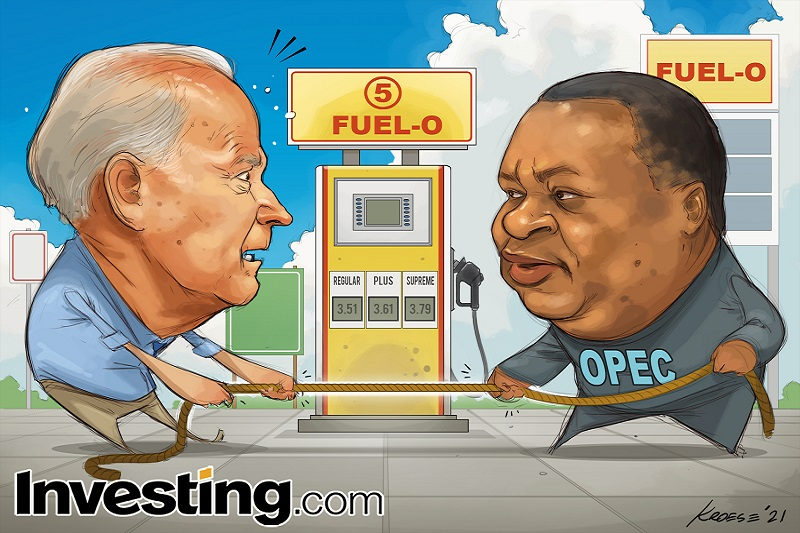 © Investing.com
© Investing.com By Geoffrey Smith
Investing.com -- The tug of war between Joe Biden and OPEC might be over before it’s even begun – and not in a way that the U.S. President will welcome.
Biden’s National Security Advisor Jake Sullivan called on the world’s big oil exporters to last week, after U.S. gasoline prices hit their highest in seven years.
Noting that crude prices were now above where they were before the pandemic, Sullivan argued that “higher gasoline costs if left unchecked, risk harming the ongoing global recovery.”
Not so, countered the Organization of the Petroleum Exporting Countries over the weekend: a Reuters story citing four anonymous sources within the bloc insisted that there was to match global demand, reminding people that its agreement with Russia and others foresees another 400,000 barrels a day hitting the world market every month until all of last year’s emergency output cuts are reversed.
Sullivan might have spared his breath. Prices are falling rapidly in any case, due largely to factors outside either OPEC’s or Washington’s control.
By 12 PM ET (1600 GMT) on Tuesday, U.S. were at $66.72 a barrel, more than 13% off their highs of earlier in the month. , the global benchmark, was down nearly 11% from its peak.
Demand in China is slowing sharply as Beijing’s zero tolerance approach to Covid-19 struggles to rein in a spate of coronavirus outbreaks. The subsequent lockdowns have taken a heavy toll on fuel demand: according to data from Baidu (NASDAQ:), intercity mobility crumbled in China in the first half of August. Last week alone, movement into and out of Beijing and Shanghai fell by 37% and 23%, respectively. Across a broader measure of major cities, it fell 15% on the week and was down 37% from the July average.
In such conditions, there is precious little need for China, the world’s biggest importer, to be buying crude on the market at $70 a barrel when it is still sitting on mountains of crude bought for next to nothing last year. As China accounts for 13% of world oil demand, a sudden stop of imports there has an outside impact on world prices.
Indeed, as China’s industrial output data showed earlier this week, Chinese refiners cut their throughput to the in July, leaving it down in year-on-year terms for the first time since March last year at the height of the pandemic’s first wave panic. Reuters quoted one Chinese refinery official as saying on Monday that cuts of another 3% to refinery runs are scheduled this month.
In addition to that, the spread of the coronavirus is obviously starting to affect the willingness of Americans to travel within their country – not least since the infection rate in the country’s top tourist destination of Florida is currently off the scale, with hospital admissions for Covid-19 running well above previous peaks.
Figures from the Transportation Security Administration show that the number of passengers going through U.S. airports has fallen for each of the last two weekends, suggesting that the initial surge of pent-up demand for travel has run into a new headwind of caution. TSA numbers showed last weekend’s passenger numbers were down 3.5% on the week, and down over 5% from the last weekend in July.
In an optimistic scenario for oil, China gets on top of its Covid-19 outbreaks quickly and returns to the record levels of consumption it was posting only two months ago. At the same time, a revitalized vaccination campaign in the U.S. brings infection rates down and allows demand in the world’s biggest consumer to close the gap with pre-pandemic demand. Whether this can be achieved before the U.S. "driving season" ends after the Labor Day weekend - less than a month away - is questionable.
By contrast, if neither of those two events materializes, and the economies of Asia in particular remain prey to repeated outbreaks, then the global economic rebound will not stay on track. Far from adding supply to the market faster, the OPEC+ bloc may well find itself under pressure to postpone some of the supply increases it has now committed to.
``````````````````````````````````````````````````````````````````````````````
https://www.investing.com/